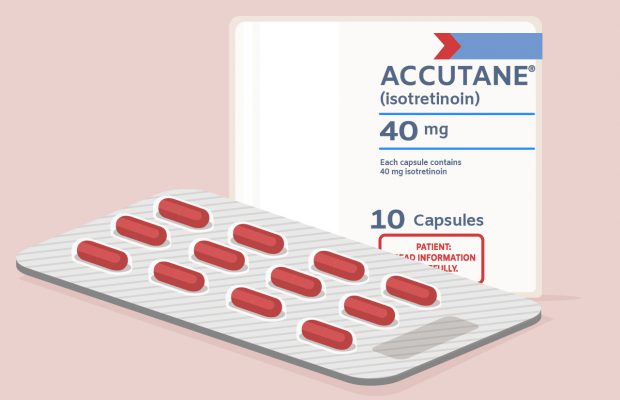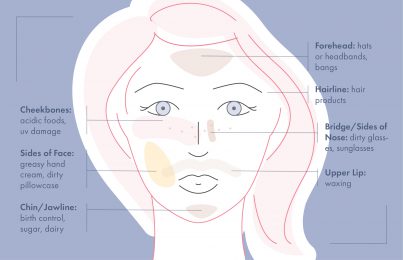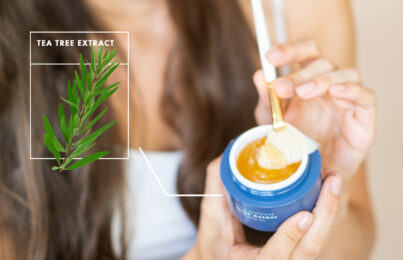Updated 2/18/21. In my 30-year career as an esthetician, I’ve seen so many clients with severe acne. I’ve also personally dealt with adult cystic acne, so believe me when I say that I understand the desperation that can come with trying to achieve clear skin. If you’re reading this post, you’re probably someone who has tried pretty much everything to lessen breakouts, and while you may had some success, you’re looking for a way to banish acne for good. In this post, I’ll share my experiences with Accutane as well as my personal opinion on whether or not it’s something worth consulting with your doctor about.
Background
Let’s start with some facts. Accutane is actually one of the many brand names for Isotretinoin, which is a potent form of vitamin A. Other brand names include Amnesteem, Claravis, and Sotret. No one knows quite how or why Accutane is so effective, but we do recognize four ways it curbs acne development:
- Inhibits sebum production. Accutane dramatically reduces the amount of oil that your skin’s glands produce, which is why so many patients experience extremely dry skin during and after treatment.
- Reduces acne-causing bacteria. Since oil is a breeding ground for acne-causing bacteria, less oil means fewer opportunities for these bacteria to thrive.
- Prevents clogged pores. Accutane regulates the rate of cell turnover in our skin, which keeps skin cells from getting stuck and clogging pores.
- Reduces inflammation. Inflammation is one of the underlying causes of acne, and Accutane’s anti-inflammatory properties address this.
It’s estimated that Accutane permanently clears acne after one round in about 85 percent of patients. This is definitely an impressive statistic. However, taking Accutane doesn’t guarantee clear skin, and remission is possible. The most important thing when undergoing any acne treatment is to discuss it with your doctor to manage expectations. Acne is a disease for which there is no known “cure.” I know this is hard to hear, but it’s the truth. There are certainly many things you can do to successfully control acne, but as I always tell my clients, it’s unrealistic to expect any one treatment to keep you from ever getting a pimple again (Accutane included).
Read: The Science Behind the Breakout—Why You Get Acne
Who Should Consider Accutane?
With that being said, if you are truly struggling to manage severe acne, I definitely think Accutane is worth discussing with your doctor. How do you know when it’s time to start having that conversation?
If You’re Someone With Severe, Inflamed Acne
First, consider what type of acne you’re dealing with. Not all acne is the same, so treatments will vary accordingly. Accutane is technically indicated for both inflammatory and non-inflammatory acne. Based on what I have personally seen and the feedback I’ve gotten from clients over the years, I believe Accutane is more effective for inflammatory acne, specifically pustular, cystic, and nodular acne. In my experience, clients with inflammatory acne tend to get the best results from this drug. If your main concern is clogged pores and bumpy texture, I would probably recommend something else.
If You’re Someone Who’s at Risk of Scarring
I also like to assess someone’s risk for scarring. The types of inflammatory acne I mentioned, especially cystic and nodular, can cause permanent damage to the dermis layer in the form of scarring. In this case, I don’t mean dark or red marks that will fade over time; I’m referring to the pitting or indentations that can permanently alter the texture of someone’s skin. If you’re at risk for this type of scarring, I would say Accutane is worth discussing with your doctor.
Read: How to Smooth Indented Acne Scars
If You’re Someone Who’s Tried Everything Else
Finally, be sure you’ve exhausted all other options. In general, I prefer to treat acne without prescriptions as much as possible. Why expose the skin to something harsh if it’s not necessary? Accutane is as harsh as it gets when it comes to acne treatments, so in my opinion, it should definitely be a last resort. Taking Accutane is also a big commitment. It requires regular blood work, a consistent home skincare routine to manage dryness, diligent sunscreen use, and monthly pregnancy tests for women. It’s certainly not a “quick fix.”
*Note: Accutane can cause serious birth defects, so if you’re pregnant or planning to become pregnant, this medication is not for you.
What About the Side Effects?
If you google Accutane, chances are you’ll come across a laundry list of warnings and possible side effects. While these can be very serious and should not be taken lightly, I also believe that Accutane has gotten a bad reputation, because the media tends to pick up the most extreme cases for stories. The more serious side effects Accutane has been linked to include depression, suicide, and inflammatory bowel disease. Accutane hasn’t been proven to be the direct cause of any of these, but depending on your history, they’re definitely risks you should discuss with your doctor. I think it’s worth noting that severe acne can also be a cause of depression.
The main side effect people tend to experience is extreme dryness of the skin and lips. You’ll definitely have to switch up your regular routine and be diligent about caring for your skin to manage this. For instance, you’re probably used to using moisturizers that are lightweight and oil-free. Once you start Accutane, it’s best to use a moisturizer with barrier-repairing lipids.
Overall, I’ve heard way more positive stories about Accutane than negative, based on client feedback alone. If you have severe acne and nothing else has worked, it’s definitely worth doing some research and talking to a doctor. I’ve seen firsthand the emotional toll acne can take on people. When Accutane works for someone who’s tried everything else, it can be life-changing.
Read: How to Get Rid of Dry Skin Caused by Harsh Acne Treatments
Things to Consider Before Accutane
Here’s an overview of the steps I would take with a client before suggesting they talk to their doctor about Accutane:
- Get a Consultation. The first step is always to conduct a thorough consultation. This will help me better understand a client’s breakout history and assess what we’re dealing with. If you haven’t yet, consider seeing a trained esthetician for a consult—don’t go it alone!
- Review Your Diet. Dairy is a common culprit for adult hormonal acne. Cutting down on dairy often helps minimize cystic acne.
- Get a Deep Pore-Cleansing Facial. This is a great option for someone looking to tame breakouts. The esthetician must be an experienced acne specialist who is skilled at extractions to clear out clogged pores, since these are precursors to breakouts.
- Build a Comprehensive Routine. My final step would be to identify my client’s skin type, then design a comprehensive routine for them. Again, this is where it helps to get some professional guidance from an esthetician. If you’re dealing with stubborn acne, you likely need a routine that goes above and beyond just cleansing and moisturizing. This can get confusing, and an esthetician can guide you.
I ask my clients to follow a new routine for at least two months before assessing its efficacy. I also like to make tweaks along the way as needed. From there, if their acne has not decreased by at least 50 percent, I might suggest kicking it up a notch in one or more of the following ways:
- Benzoyl Peroxide. Try using a topical, over-the-counter benzoyl peroxide lotion. This targets different strains of bacteria that can cause acne. I suggest starting with a strength of 2.5 percent, then bumping it up as needed.
- Chemical Peel. Consider a salicylic acid chemical peel administered by a trusted skincare professional. Getting these on a regular basis (as much as twice a month) can really improve blemishes and post-breakout marks.
- Hormone Panel. Speak to your gynecologist about getting your hormones checked to see if there is an imbalance. They might prescribe oral contraceptives (birth control pills), as certain types can reduce acne in some women.
- Prescription Medication. If you are open to pursuing prescription medications, speak to a dermatologist. There are a few options to try before Accutane. This could include oral antibiotics like tetracycline or minocycline. There is also an oral prescription called Spironolactone that is being prescribed off-label for improving adult hormonal acne in women. Topical prescriptions like retinoids are an option as well. Of course, these are all conversations you’ll want to have with a dermatologist who has assessed your skin.
If you’ve tried these other options, and your acne still isn’t improving, then it would certainly warrant a conversation with your doctor about Accutane.
Bottom Line: If you’re dealing with severe inflammatory acne that could cause permanent scarring, and you have exhausted all other options, I believe it’s worth talking to your doctor about Accutane. It’s important to be aware of potential side effects, but in my experience, the positive impacts far outweigh the negative. I hope you found this information helpful in your quest to getting clearer skin!
Celebrity Esthetician & Skincare Expert
As an esthetician trained in cosmetic chemistry, Renée Rouleau has spent 35 years researching skin, educating her audience, and building an award-winning line of products. Her hands-on experience as an esthetician and trusted skin care expert has created a real-world solution — products that are formulated for nine different types of skin so your face will get exactly what it needs to look and feel its best. Trusted by celebrities, editors, bloggers, and skincare obsessives around the globe, her vast real-world knowledge and constant research are why Marie Claire calls her “the most passionate skin practitioner we know.”



